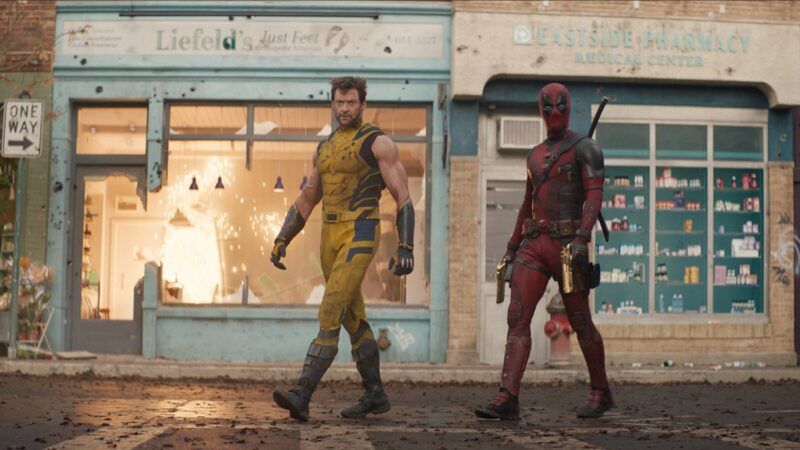With Deadpool & Wolverine, Marvel Has Lost the Plot
A sad, shallow, and pandering movie that shows the MCU has no real stories left to tell.

If nothing else, it's perfectly telling that Deadpool & Wolverine takes place in a liminal space called the Void. The latest franchise assault from the Marvel Cinematic Universe (MCU)—and, mercifully, the only formal entry this year—is an empty exercise in winking self-promotion, like a made-for-YouTube fan film that somehow ended up on the big screen. It's a vapid, frantic movie about how Marvel's wildly successful comic book movie universe has lost its ability to authentically connect—that itself has no capacity to authentically connect.
Consider the old screenwriter's maxim: "Raise the stakes." The underlying idea is that a good story should reveal what a character cares about most in the world, and then put whatever that is in jeopardy. This heightens the drama and draws in viewers. Viewers care about the characters because the characters care about something important to them.
Deadpool, one of the film's two titular characters, does not care about anything in the film. Oh sure: In theory, he pretends that his quest is to save a group of close friends who we see for a few minutes at the beginning of the movie. Their timeline—their branch of the multiverse—is about to be destroyed by the Time Variance Authority (TVA), the in-universe bureaucracy that Marvel has used to shake up and clean up their narrative misfires for the last few years.
But the stakes of the movie don't really have anything to do with Deadpool's friends or their timeline. That's because the stakes of the movie are very clearly, and often quite explicitly, about the MCU itself. Throughout the film, Deadpool refers to himself as Marvel Jesus, because he is fighting to save the Marvel Cinematic Universe.
And so, from the opening moments, the movie becomes a sort of knowing, perpetually wisecracking tribute to the MCU, with clip reels of fan-favorite moments (remember Endgame?) and jokes about the franchise's sorry state ("You're entering at kind of a low point," Deadpool says to Wolverine). By the end of the movie, that state is even sorrier.
Even before the opening Marvel logo has finished playing, Deadpool (Ryan Reynolds, at his most successful and most tiresome) begins interrupting to tell viewers how exciting it is. He offers some vulgar joke-filled explanation for what's about to happen, which is that Wolverine, a Marvel comics character previously left out of the Marvel movie universe for extrinsic intellectual property rights-related reasons (Wolverine and his fellow X-Men were owned by Fox), is finally going to become part of the franchise (because Marvel's parent company, Disney, bought Fox).
Sure, this setup is explained via cartoonishly bloody slow-motion violence and a lot of scatological, R-rated quips, but at its core, it has all the heart and thrills of reading a mergers and acquisitions report in Variety.
Deadpool's first problem is that in the Fox films where Wolverine has already appeared, Wolverine has already died. So he has to use a TVA gadget to find another Wolverine from another timeline (once again, the TVA bureaucracy becomes a vital crutch to fix the franchise's out-of-universe mistakes). This allows him to meet other versions of Wolverine that might have been—all of which are either nods to beloved comic book lore or rumors of unmade comic book movies that stretch back more than a decade. The rest of the film similarly piles up cameos and Easter eggs, to the point where crude self-referentiality overwhelms all else. It has precious little to say about these nods to comic book movie lore; it's just enough that you, the fan, recognize the reference. It's the "Leonardo DiCaprio pointing at the television in recognition" meme in feature film form.
Deadpool & Wolverine is a product, not a movie, and it's aimed squarely at those poor, sad souls who have invested years of their lives into following not just Marvel's characters in comics and then movies, but the behind the scenes business sagas, involving intellectual property disputes and studio marketing strategies, and unrealized projects and misfires from the early days of the superhero movie boom. It's a movie for middle-aged nerds who still remember the Hollywood column in Wizard magazine circa 1994. I can say this because, well, I'm one of those sad souls. I still have great fondness for Marvel's comic-book characters. But I'm old enough to know this stuff is pandering, shallow, and awful.
The root problem in Deadpool & Wolverine is that Deadpool and Wolverine aren't the story. Marvel—the brand, the comics, the films, the franchise, the incredibly successful but recently struggling corporate entity—is the story. And I'm a Marvel fan not because I care about the corporate brand entity in some abstract sense, but because I care about the characters, the stories, their adventures, and the authentic stakes of their lives. This movie doesn't.
The MCU hasn't just lost the plot. It has made itself the plot because it plainly has no other story to tell.


Show Comments (52)